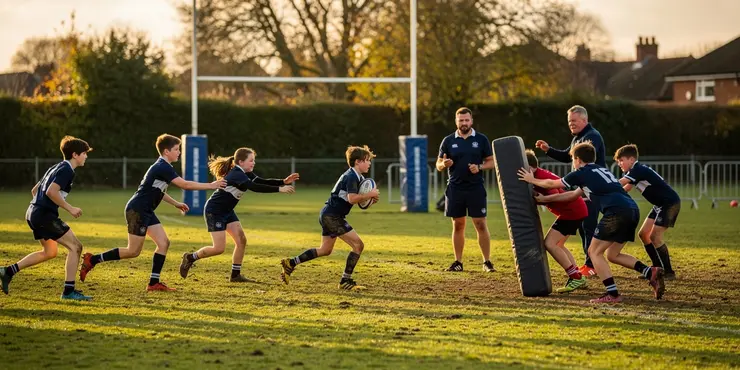
Find Help
More Items From Ergsy search
-
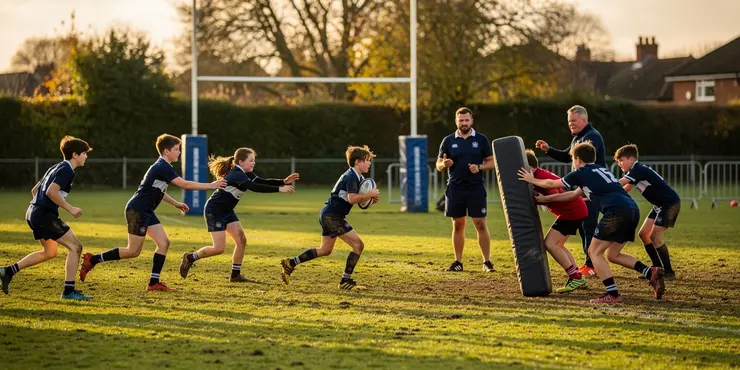
What age groups are most at risk for concussions in rugby?
Relevance: 100%
-
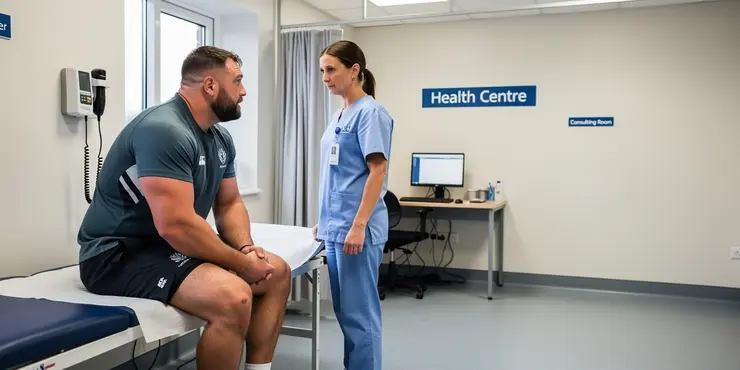
Are Concussions common in Rugby?
Relevance: 78%
-
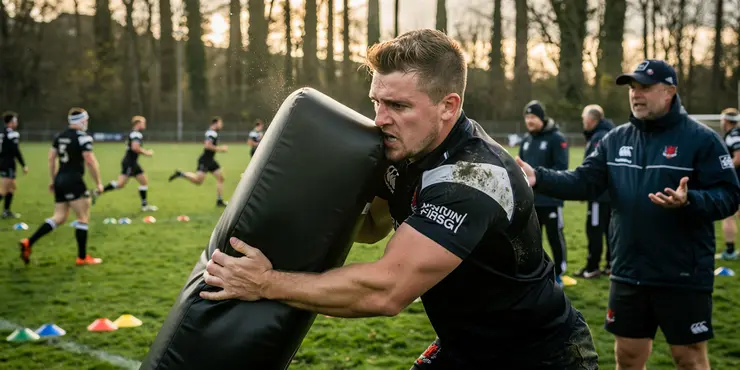
What causes concussions in rugby?
Relevance: 71%
-
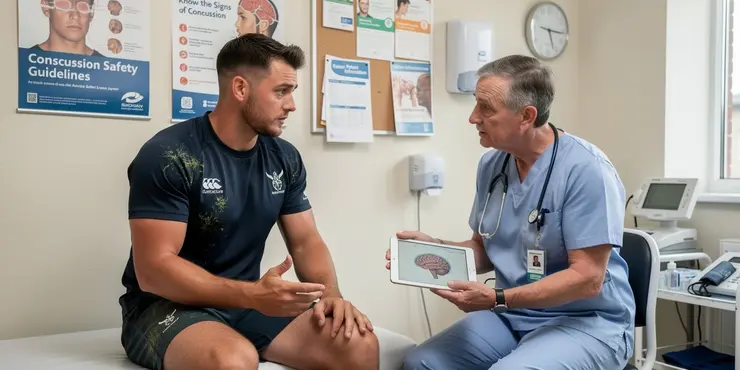
Are helmets required in rugby to prevent concussions?
Relevance: 71%
-
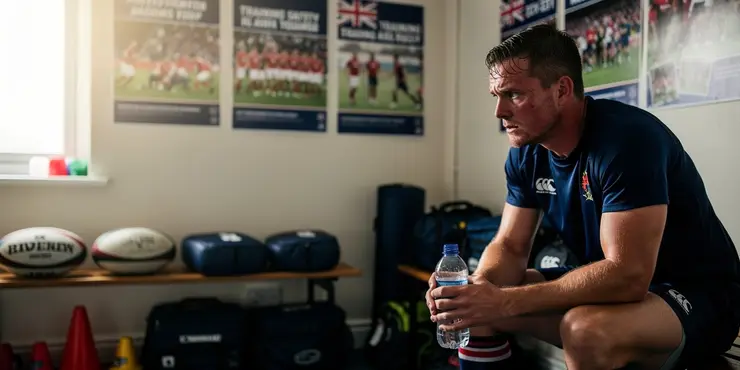
Is there a protocol for managing concussions in rugby?
Relevance: 68%
-
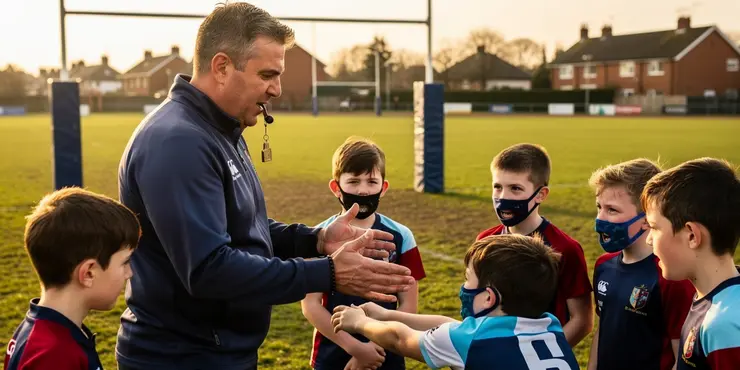
How can concussions be prevented in rugby?
Relevance: 67%
-
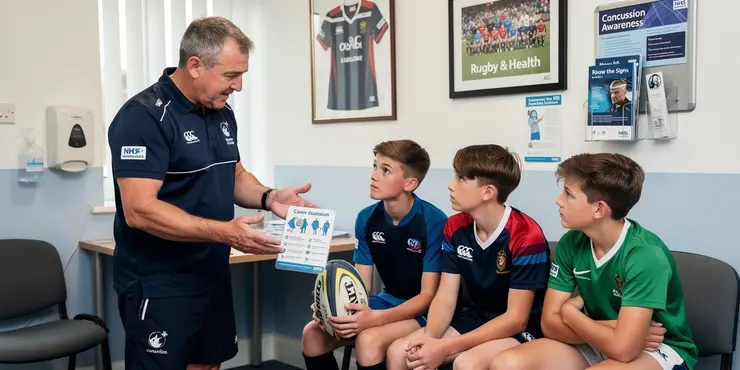
Is there a difference in concussion rates between amateur and professional rugby?
Relevance: 65%
-
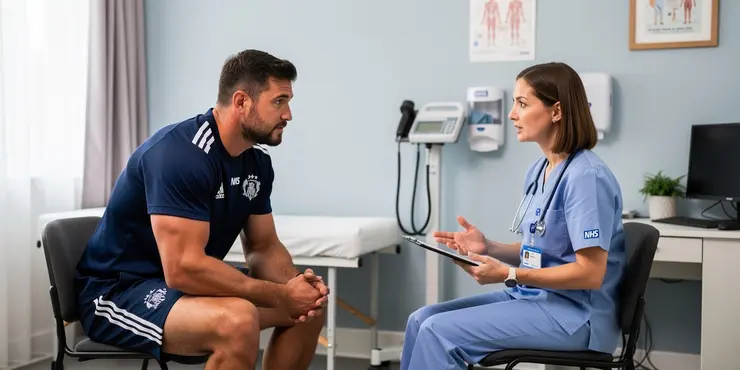
How do concussions impact long-term health in rugby players?
Relevance: 64%
-
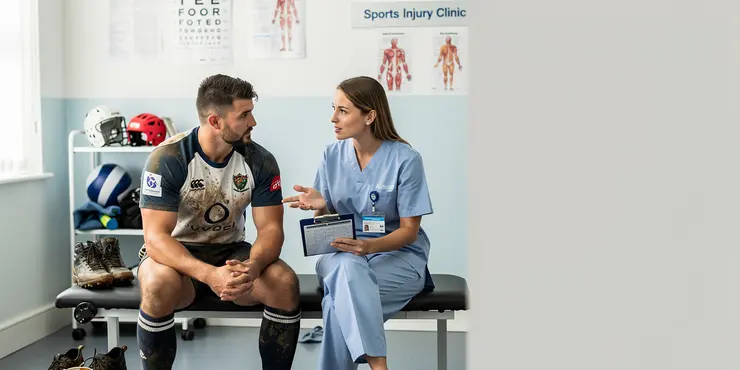
What support is available for rugby players who suffer concussions?
Relevance: 60%
-
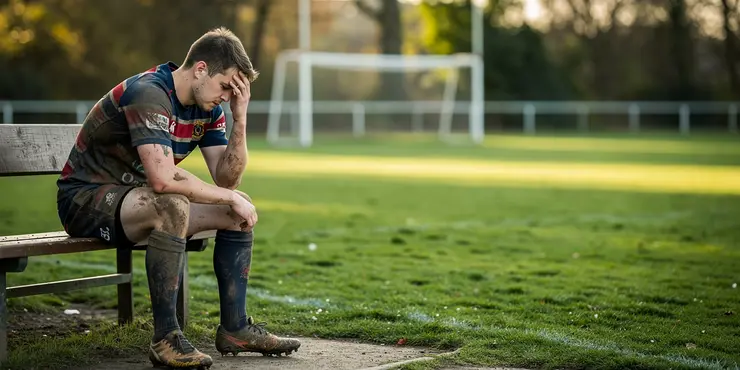
Can playing sports increase the risk of a concussion?
Relevance: 50%
-
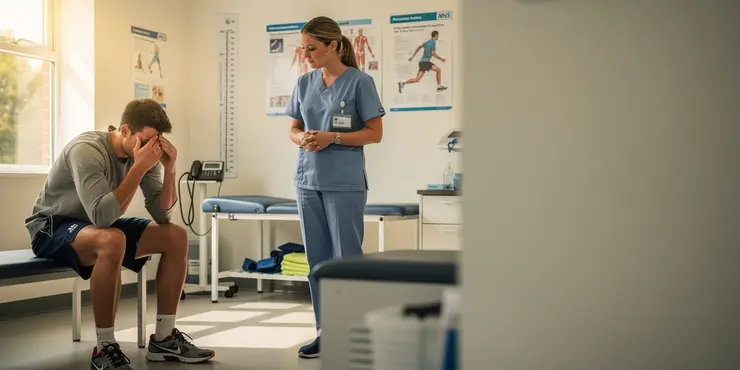
What is Concussion?
Relevance: 46%
-
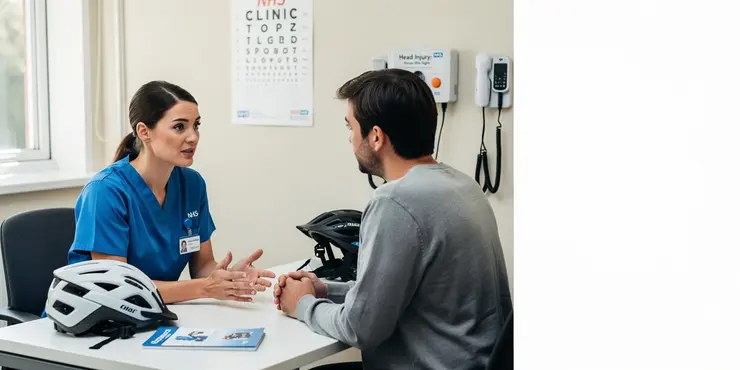
Is there any way to prevent concussions?
Relevance: 45%
-
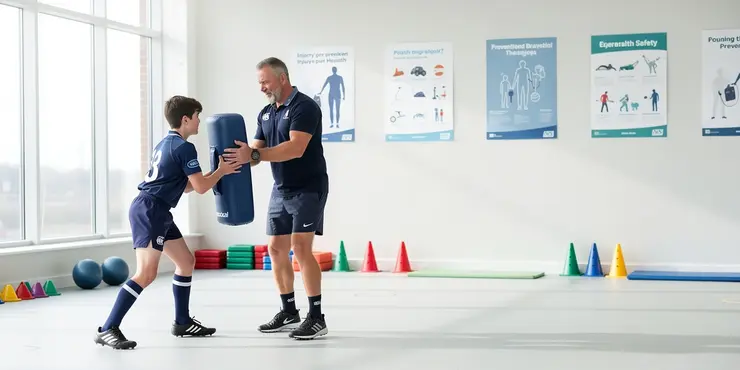
How can concussions be prevented?
Relevance: 45%
-
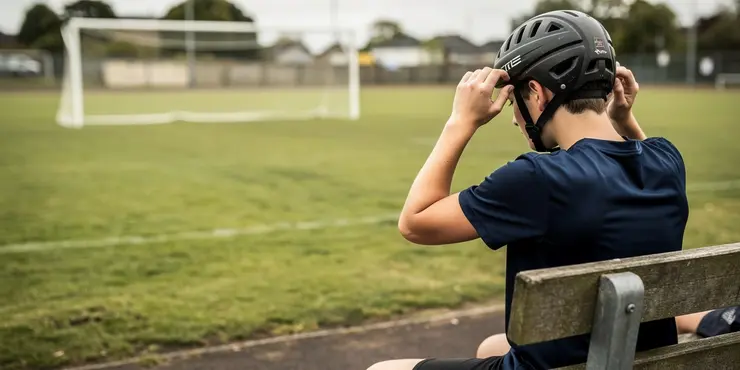
How can concussions be prevented?
Relevance: 43%
-

What age group is most at risk for HPV?
Relevance: 43%
-
What age group is most at risk for grooming?
Relevance: 42%
-
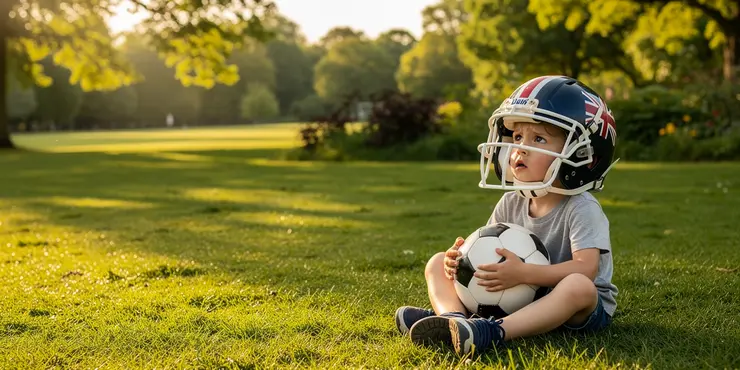
Are children more susceptible to concussions than adults?
Relevance: 40%
-
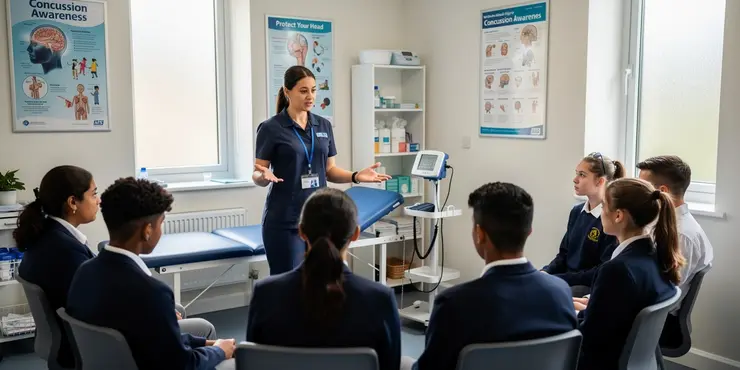
What role do schools play in managing concussions?
Relevance: 37%
-
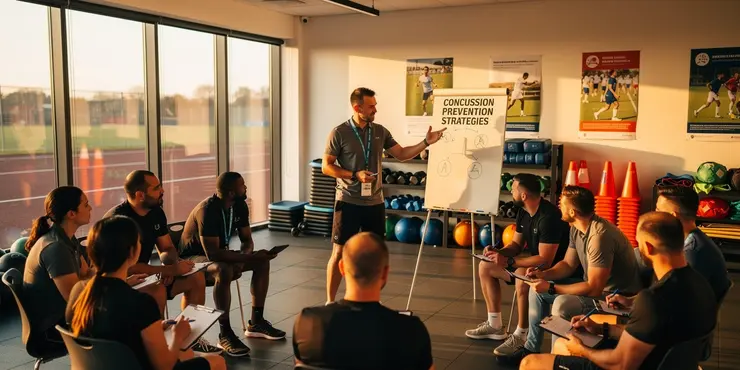
Is training available for coaches to help prevent concussions?
Relevance: 35%
-
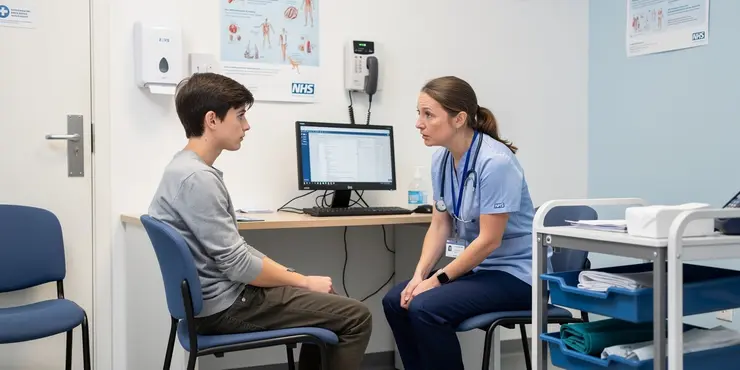
Is appendicitis common in any particular age group?
Relevance: 35%
-

Is asthma more common in certain age groups?
Relevance: 34%
-

Is headache a symptom of a concussion?
Relevance: 33%
-

How is a concussion diagnosed?
Relevance: 33%
-
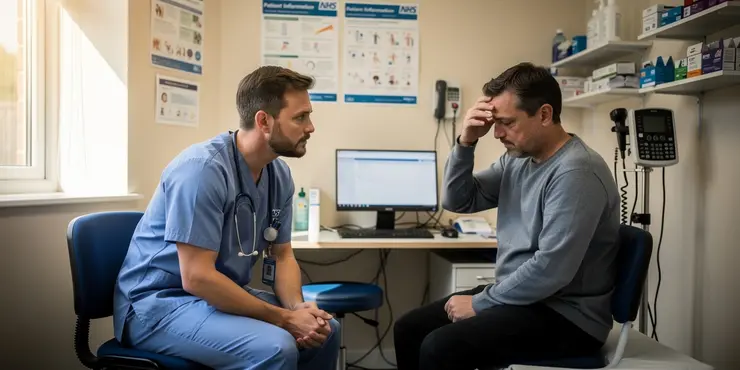
How is a concussion diagnosed?
Relevance: 33%
-

Can a concussion cause memory problems?
Relevance: 33%
-

What are common symptoms of a concussion?
Relevance: 33%
-

Can concussions lead to mental health issues?
Relevance: 33%
-

Should people with a concussion avoid screens and technology?
Relevance: 32%
-

What age groups can benefit from self-testing?
Relevance: 32%
-
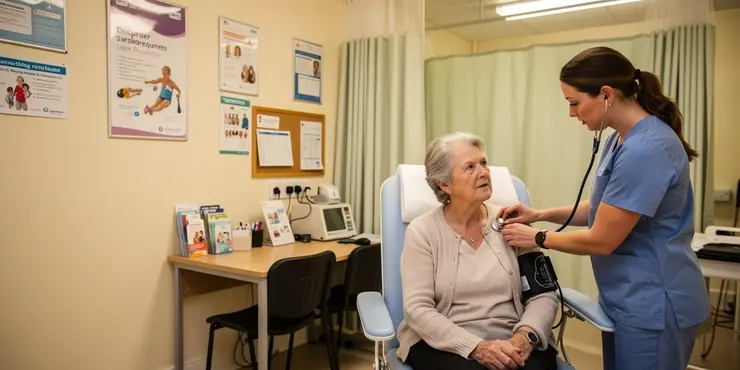
Is it safe to sleep after a concussion?
Relevance: 32%
-

Is it safe to sleep after a concussion?
Relevance: 31%
-
Is aspirin more effective for certain age groups in preventing colorectal cancer?
Relevance: 31%
-

When is it safe to return to normal activities after a concussion?
Relevance: 31%
-
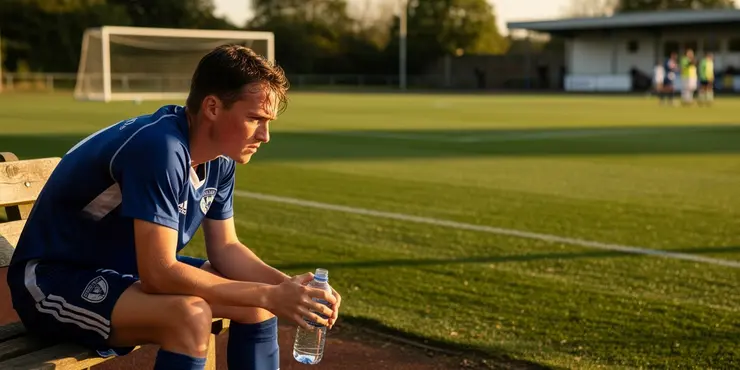
Can players return to play on the same day after a suspected concussion?
Relevance: 30%
-

What age group will first see the state pension age at 67?
Relevance: 30%
-
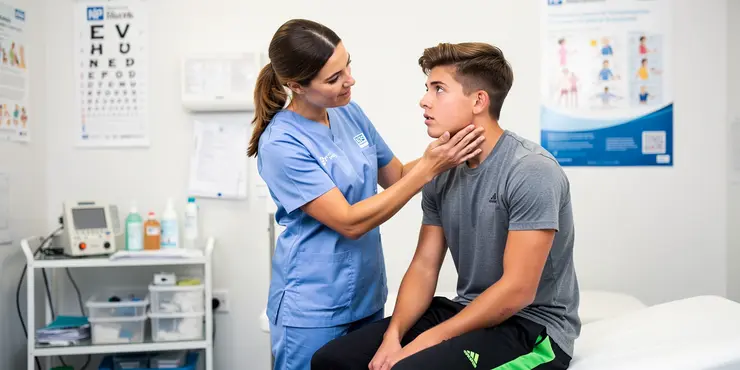
Can concussions occur without a direct blow to the head?
Relevance: 29%
-
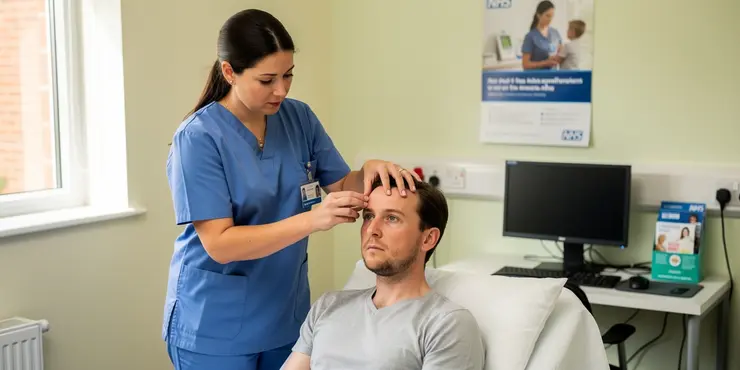
What immediate steps should be taken if someone has a concussion?
Relevance: 29%
-

When is it safe to return to normal activities after a concussion?
Relevance: 28%
-

How does age affect the risk of BPH?
Relevance: 27%
-

Is the age of menopause onset related to dementia risk?
Relevance: 26%
Age Groups Most at Risk for Concussions in Rugby
Youth Players (Ages 10-18)
Youth players, specifically those aged between 10 and 18, are considered highly susceptible to concussions in rugby. This increased vulnerability can be attributed to several factors. Firstly, at this developmental stage, players are still mastering the fundamental skills and techniques essential for safely engaging in the sport. Their incomplete grasp on proper tackling forms and other rugby-specific skills can lead to unsafe play practices, increasing their risk of head injuries. Furthermore, given that cognitive and motor skills are still maturing, reactions may be slower, making younger players more prone to mishaps and collisions on the field.Adolescent Players (Ages 15-19)
Adolescents, particularly those aged 15 to 19, face a notable risk of concussions due to their participation in more competitive and physically demanding rugby matches. At this stage, many players transition to higher levels of competition, where the pace and physicality of the game significantly intensify. This competitive environment can sometimes lead to aggressive play styles and heightened physical contact, both of which pose a greater risk for concussion-inducing scenarios. The increased competitive stakes and the drive to perform at a high level often lead to situations where safety measures may be inadvertently overlooked.Adult Players (Ages 18-30)
Adults aged 18 to 30 also face considerable concussion risks in rugby. This age group typically includes players engaged in high-level amateur and professional rugby, where the speed and intensity of the game are at their peak. In these settings, the physical demands and competitive nature of matches are significantly heightened, resulting in a greater likelihood of high-impact collisions. Moreover, the culture around playing through injuries, which can sometimes prevail in adult rugby, might result in head injuries being underestimated or insufficiently addressed, thus exacerbating concussion risks.Older Adult Players (Ages 30 and Above)
While less prevalent, older adult rugby players, those aged 30 and above, can also be at risk for concussions. Although these players generally have more experience and handle themselves safely, age-related physical changes such as reduced reaction times and decreased recovery capabilities might contribute to an increased concussion risk. Additionally, prior head injuries that did not heal properly may make them more susceptible to further concussions. For older players returning to or continuing to participate in rugby, maintaining fitness and ensuring safety measures are critical to mitigating concussion risks.Who is Most at Risk for Concussions in Rugby?
Young Players (Ages 10-18)
Kids aged 10 to 18 are more likely to get head injuries, called concussions, when playing rugby. This is because they are still learning how to play safely. They might not know how to tackle correctly yet. Their thinking and moving skills are not fully grown, which means they might not react quickly enough to avoid getting hurt.Teenage Players (Ages 15-19)
Teens aged 15 to 19 also have a high chance of getting concussions. They often play in more difficult games. These games can be tough and fast, which leads to more chances of getting hurt. When playing, they might focus more on winning and forget about being safe.Adult Players (Ages 18-30)
Adults aged 18 to 30 can get concussions too. They often play in games that are very fast and intense. These games can have a lot of hard bumps and crashes. Sometimes, they keep playing even when they feel hurt, which can make head injuries worse.Older Players (Ages 30 and Up)
Players aged 30 and up can also get concussions, though less often. They might react more slowly as they get older. If they had head injuries before, they might get hurt again more easily. It’s important for older players to stay fit and follow safety rules to avoid getting hurt.Ways to Stay Safe
- **Wear Proper Gear:** Use helmets and mouthguards. - **Learn Safe Techniques:** Practice tackling and playing safely. - **Rest When Injured:** Take breaks if hurt and let injuries heal. - **Ask for Help:** Talk to a coach or doctor if you feel unwell. Staying safe and following these tips can help reduce the risk of concussions.Frequently Asked Questions
What age group is most at risk for concussions in rugby?
Teenage players, especially those aged 15-19, are at a higher risk for concussions in rugby due to the intensity of play and developing bodies.
Are younger children in rugby at risk for concussions?
Yes, younger children can also suffer concussions, but the risk is generally lower compared to older teenagers and adult players.
Why are teenagers at higher risk for concussions in rugby?
Teenagers are at higher risk due to a combination of factors such as increased physical contact, growing bodies, and less experience in tackling and falling safely.
How do the risks of concussions change with age in rugby?
Risks may increase with age and level of competition, peaking in late teens to early adulthood when play becomes more competitive and physical.
Do adult rugby players experience concussions more than younger players?
Adult players also face a significant risk, though they might be better at recognising symptoms and receive more targeted training to reduce risk.
How can younger rugby players reduce the risk of concussions?
Proper coaching on tackling techniques, wearing appropriate headgear, and ensuring players understand the signs of a concussion to report them early can help reduce risks.
Is concussion management different for different age groups in rugby?
Yes, concussion management is tailored to the age and development stage of the player, with younger players often requiring longer recovery times.
What are some common signs of a concussion in young rugby players?
Common signs include headache, dizziness, confusion, memory loss, and changes in behaviour. Any suspected concussion should be evaluated by a healthcare professional.
How can coaches help prevent concussions in youth rugby?
Coaches can help by promoting proper techniques, ensuring safe playing conditions, and encouraging a culture where players feel comfortable reporting symptoms.
Are there specific rules in youth rugby to help prevent concussions?
Yes, youth rugby often has modified rules focusing on safety, such as limited tackling and stricter enforcement of no high tackles.
What role do parents play in managing concussion risks in youth rugby?
Parents should be informed about concussion symptoms and ensure their child follows medical advice if a concussion is suspected, including rest and recovery procedures.
How is concussion awareness promoted in rugby at the community level?
Campaigns, workshops, and educational materials for coaches, players, and parents are used to raise awareness and educate on prevention and management.
Are there any age-specific guidelines for return-to-play after a concussion in rugby?
Yes, younger athletes are often recommended to follow a more conservative approach, involving extended rest and a gradual return-to-play protocol under medical supervision.
What are the long-term impacts of concussions for young rugby players?
Repeated concussions can lead to long-term health issues such as cognitive impairments and emotional difficulties, highlighting the importance of proper management.
Besides age, what other factors contribute to the risk of concussions in rugby?
Other factors include the level of competition, playing position, adherence to rules and safety standards, and individual physical conditioning and technique.
Who is most likely to get hurt in the head when playing rugby?
When we play rugby, some people are more likely to hurt their heads. We call this a concussion. It's important to be safe.
To help understand:
- Talk to adults or coaches about how to stay safe.
- Wear the right gear, like a helmet.
- Watch videos that show how to tackle safely.
Teenagers who play rugby, especially those who are 15-19 years old, have a higher chance of getting head injuries. This is because the game is very rough, and their bodies are still growing.
Can young kids playing rugby hurt their heads?
Yes, little kids can get concussions too, but it doesn't happen as much as with older kids and grown-ups.
Why do teens get more head injuries in rugby?
Teens playing rugby are more likely to hurt their heads. This happens because:
- Growing Bodies: Teens' bodies are still growing and changing, which can make them more fragile.
- Learning Skills: Teens are still learning how to play safe, so they might make mistakes.
- Fast and Strong: Rugby is a fast game, and players can bump into each other hard.
Rugby can be fun, but it's important to wear good safety gear and follow the rules. If you get hurt, tell an adult right away.
Tip: Use special helmets and mouthguards to help stay safe.
Teenagers can get hurt more easily. This is because they touch each other more, their bodies are still growing, and they don't know as much about being safe when they fall or tackle.
Do the risks of head injuries change with age in rugby?
Playing rugby can sometimes cause head injuries, like bumps or bruises.
These injuries are called concussions.
As players get older, like moving from children to adults, the risk of getting a concussion can change.
It's good to talk to a coach or doctor if you're worried about head injuries in rugby.
You can also wear safety gear, like a helmet, to help protect your head.
As people get older and sports get tougher, the risks can get bigger. This happens most from teenage years to early adulthood because the games are more serious and players are more physical.
Do grown-up rugby players get head injuries more than younger players?
Grown-up rugby players are adults who play rugby. Rugby is a sport where players run, pass, and tackle.
A concussion is a type of head injury. It happens when the brain is hurt.
The question is: Do grown-up rugby players get head injuries more often than younger players?
To understand better, you can ask someone to explain it to you or use pictures to help.
Grown-up players also have a big risk. But they might be better at knowing when something is wrong. They might also get special training to help stay safe.
How can young rugby players stay safe from head injuries?
Rugby is fun, but players can get hurt. Here are some ways to stay safe:
- Listen to your coach. They know how to play safely.
- Wear a helmet and mouthguard. These protect your head and teeth.
- Practice tackling the right way. Good technique helps you avoid injuries.
- Talk to your coach if you feel dizzy or hurt. Rest if you need to.
- Play by the rules. Rules make the game safer for everyone.
Remember to ask an adult if you have any questions. Stay safe and have fun!
Coaches can help by showing the right ways to tackle. Wearing the right helmet also keeps players safer. Players should know what a concussion feels like and tell someone straight away if they think they have one.
Is taking care of a concussion different for kids and adults in rugby?
When someone gets a hit on the head while playing rugby, it's called a concussion.
Kids and adults need different ways to get better from a concussion.
For kids, it might take longer to feel okay again.
It's important to rest and listen to what the doctor says.
Using simple tools like a calendar or reminders can help remember what to do.
Grown-ups should also follow advice and rest until they feel better.
Yes, taking care of a concussion depends on how old the player is and how they are growing. Younger players usually need more time to get better.
What are signs of a concussion in young rugby players?
A concussion is a type of injury to the head. It can happen if you get a hard bump on your head.
Here are some signs to look for:
- Headache: Feeling like your head hurts.
- Dizziness: Feeling like everything is spinning.
- Trouble seeing: Eyes are blurry or can't see well.
- Tiredness: Feeling very sleepy or no energy.
- Confusion: Feeling mixed up and having a hard time thinking.
- Nausea: Feeling like you might throw up.
If you see these signs, tell an adult or coach right away.
Use pictures or videos to help understand better. You can also ask someone to help you read.
Common signs of a concussion are:
- Headache (your head hurts)
- Feeling dizzy (the world spins)
- Feeling confused (things don’t make sense)
- Trouble remembering things
- Acting differently (your behavior changes)
If you think someone has a concussion, they should see a doctor.
It can help to use pictures or videos to understand better. Taking your time and asking someone to explain the words you don’t know can also be helpful.
How can rugby coaches stop concussions in young players?
Coaches can help keep young rugby players safe. Here are some easy ways:
- Teach good skills: Show players how to tackle safely.
- Use the right gear: Make sure everyone wears helmets and mouthguards.
- Watch for injuries: Look out for signs of concussion and help anyone who gets hurt.
- Take breaks: Let players rest during games and training.
- Learn first aid: Know what to do if someone gets injured.
Using these tips, coaches can keep their players safe and healthy.
For more help, coaches can look online or take classes about rugby safety.
Coaches can help by teaching players how to play safely, making sure the field is safe, and telling players it's okay to talk about feeling hurt.
Are there special rules in youth rugby to stop head injuries?
Yes, when kids play rugby, the rules are a bit different to keep them safe. For example, tackling is not as strong, and there's a big rule about not tackling someone too high up.
How can parents help with concussion risks in kids' rugby?
Parents need to know what signs to look for if their child might have a concussion. If they think their child has a concussion, they should listen to the doctor and help their child rest and get better.
How do people learn about concussions in community rugby?
Rugby teams teach about head injuries. A head injury is called a "concussion."
They help everyone understand:
- What a concussion is
- How to spot a concussion
- What to do if someone gets a concussion
Coaches, players, and parents learn together. They use:
- Easy-to-read guides
- Short videos
- Fun games
These tools make learning simple and clear.
We use games, lessons, and guides to help coaches, players, and parents learn how to stay safe and play well.
Are there special rules about when kids can play rugby again after a concussion?
Yes, young sports players are often told to be careful. They should rest for a long time and slowly start playing again with a doctor's help.
What happens to young rugby players if they hurt their heads?
Getting hit on the head a lot can cause problems that last a long time. These problems can make it hard to think clearly or cause you to feel sad or upset. It is important to take good care of your head if you get hurt.
Some ways to help:
- Wear a helmet when playing sports.
- Rest and see a doctor if you get a head injury.
- Talk to someone about how you feel.
What can increase the chances of getting a concussion in rugby, apart from age?
Here are other things that can make concussions more likely in rugby:
- Playing contact positions: Players in positions where they bump into others often, like tackling, may get more concussions.
- Not using the right gear: Wearing the wrong helmet or not having a mouthguard can lead to more injuries.
- Lack of training: Players who haven't learned how to tackle safely might get injured more.
- Previous concussions: If a player has had a concussion before, they're more at risk for another one.
If you play rugby or know someone who does, make sure they have good coaching and the right safety gear to help prevent injuries.
Other things that matter are who the team is playing against, what part you play on the team, following the rules and staying safe, and how fit and skilled you are.
Useful Links
This website offers general information and is not a substitute for professional advice.
Always seek guidance from qualified professionals.
If you have any medical concerns or need urgent help, contact a healthcare professional or emergency services immediately.
Some of this content was generated with AI assistance. We’ve done our best to keep it accurate, helpful, and human-friendly.
- Ergsy carfully checks the information in the videos we provide here.
- Videos shown by Youtube after a video has completed, have NOT been reviewed by ERGSY.
- To view, click the arrow in centre of video.
- Most of the videos you find here will have subtitles and/or closed captions available.
- You may need to turn these on, and choose your preferred language.
- Go to the video you'd like to watch.
- If closed captions (CC) are available, settings will be visible on the bottom right of the video player.
- To turn on Captions, click settings .
- To turn off Captions, click settings again.
More Items From Ergsy search
-

What age groups are most at risk for concussions in rugby?
Relevance: 100%
-

Are Concussions common in Rugby?
Relevance: 78%
-

What causes concussions in rugby?
Relevance: 71%
-

Are helmets required in rugby to prevent concussions?
Relevance: 71%
-

Is there a protocol for managing concussions in rugby?
Relevance: 68%
-

How can concussions be prevented in rugby?
Relevance: 67%
-

Is there a difference in concussion rates between amateur and professional rugby?
Relevance: 65%
-

How do concussions impact long-term health in rugby players?
Relevance: 64%
-

What support is available for rugby players who suffer concussions?
Relevance: 60%
-

Can playing sports increase the risk of a concussion?
Relevance: 50%
-

What is Concussion?
Relevance: 46%
-

Is there any way to prevent concussions?
Relevance: 45%
-

How can concussions be prevented?
Relevance: 45%
-

How can concussions be prevented?
Relevance: 43%
-

What age group is most at risk for HPV?
Relevance: 43%
-
What age group is most at risk for grooming?
Relevance: 42%
-

Are children more susceptible to concussions than adults?
Relevance: 40%
-

What role do schools play in managing concussions?
Relevance: 37%
-

Is training available for coaches to help prevent concussions?
Relevance: 35%
-

Is appendicitis common in any particular age group?
Relevance: 35%
-

Is asthma more common in certain age groups?
Relevance: 34%
-

Is headache a symptom of a concussion?
Relevance: 33%
-

How is a concussion diagnosed?
Relevance: 33%
-

How is a concussion diagnosed?
Relevance: 33%
-

Can a concussion cause memory problems?
Relevance: 33%
-

What are common symptoms of a concussion?
Relevance: 33%
-

Can concussions lead to mental health issues?
Relevance: 33%
-

Should people with a concussion avoid screens and technology?
Relevance: 32%
-

What age groups can benefit from self-testing?
Relevance: 32%
-

Is it safe to sleep after a concussion?
Relevance: 32%
-

Is it safe to sleep after a concussion?
Relevance: 31%
-
Is aspirin more effective for certain age groups in preventing colorectal cancer?
Relevance: 31%
-

When is it safe to return to normal activities after a concussion?
Relevance: 31%
-

Can players return to play on the same day after a suspected concussion?
Relevance: 30%
-

What age group will first see the state pension age at 67?
Relevance: 30%
-

Can concussions occur without a direct blow to the head?
Relevance: 29%
-

What immediate steps should be taken if someone has a concussion?
Relevance: 29%
-

When is it safe to return to normal activities after a concussion?
Relevance: 28%
-

How does age affect the risk of BPH?
Relevance: 27%
-

Is the age of menopause onset related to dementia risk?
Relevance: 26%


